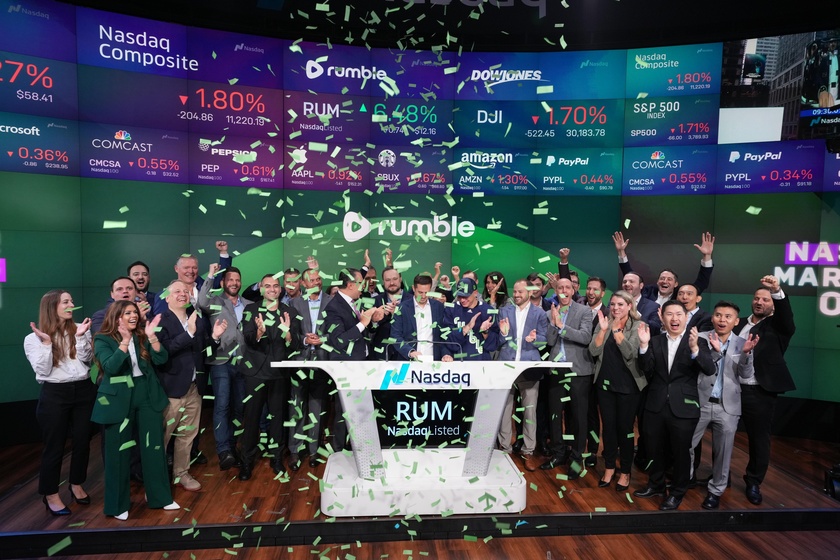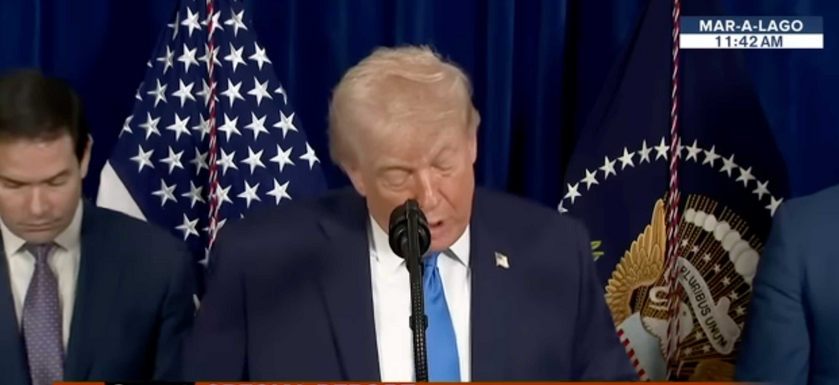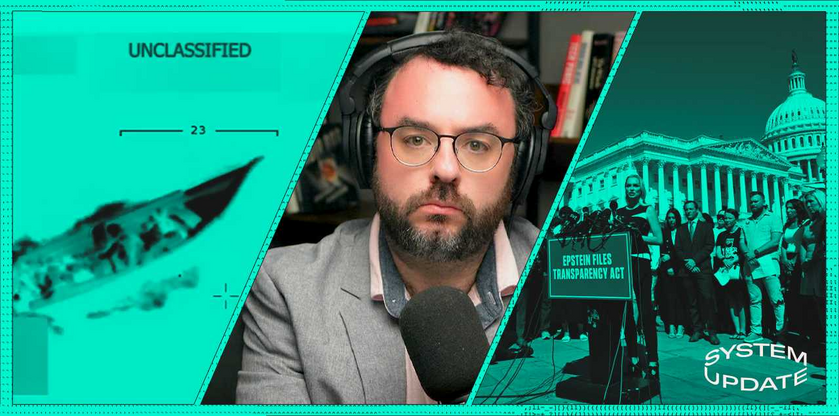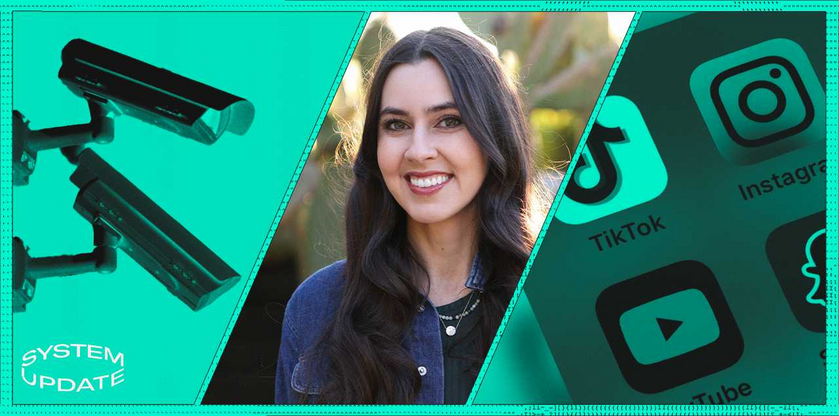
Rumble, the free speech alternative to YouTube, this week introduced two prominent and popular internet personalities to its platform: hip hop podcaster DJ Akademiks and the YouTube star JiDion. While this is something of a standard content contract, the implications of the deal are important nonetheless; it represents a larger exodus of successful content creators away from Big Tech and its rigid window of permissible thought, toward new independent platforms which promise to respect the free flow of ideas online.
It’s exactly that characteristic of independent media that attracted me to my new job here in Rio working with Glenn Greenwald at his SYSTEM UPDATE show on Rumble. As someone who has long followed the work of Greenwald and his independent contemporaries like Matt Taibbi and Aaron Mate, it is surely an exciting time for people like myself who have wanted their work to reach larger audiences.
Though we have been discussing it for some time now on System Update, the growing success of independent media platforms has become such a significant and undeniable phenomenon that even mainstream outlets can’t help but make note of it. A surprisingly fair article from New York Magazine titled “The Only Success Story in Right Wing Media,” published in February explained Rumble’s recent accomplishments.
Founded in 2013 as an alternative video-hosting service, Rumble more recently rebranded as a “neutral video platform” designed to be “immune to cancel culture.” In 2021, The Wall Street Journal reported that the company had taken investment from “a group of prominent conservative venture capitalists,” including Peter Thiel, J.D. Vance (now the junior U.S. senator from Ohio), and former Trump adviser Darren Blanton. Rumble went public last year during the SPAC mania, and shares in the company (ticker symbol: RUM) now trade on the NASDAQ; it is worth just over $3 billion. In 2022, Bloomberg reported that Rumble was among the “best performers this year among firms that merged with a special-purpose acquisition company” and that it’s “sort of” a meme stock. Last year, Rumble announced it would take over hosting and advertising duties for Truth Social and plans to offer “cloud services” more widely. According to its latest quarterly public disclosures, Rumble claims 71 million monthly active users (up from 36 million the year prior) and lost $7.8 million on $11 million in revenue, while sitting on $356.7 million of “cash and cash equivalents.” Its IPO reportedly made the founder, Chris Pavlovski, a billionaire.
Earlier this week, it was also announced that Rumble will be the exclusive partner of the Republican National Debates, clearly an encouraging milestone for the nascent company. The rapid success of Rumble ought to be contrasted with the catastrophic failure of CNN’s flagship corporate news streaming service, CNN+, a project which pitifully dissolved within its first few weeks.
And it’s obvious why Rumble is successful and CNN is failing. It’s because nobody trusts or watches cable news anymore. I’m a recent college graduate. I don’t know a single person my age who watches CNN. And just about the only time I see anyone watching cable news is when it’s on at the gym and there’s no way to change the channel. Younger generations largely prefer independent media. It has broad appeal that transcends the ideological limitations imposed by corporate news which usually makes for much more interesting and entertaining content. More than that, it’s really conventional wisdom among my generation that it’s the job of the corporate media to lie. That’s a point that was best made by the popular podcast, Full Send, when they recently hosted Tucker Carlson.
TUCKER CARLSON: I've spent my whole life in the media. My dad was in the media. That is a big part of the revelation that has changed my life is the media are part of the control apparatus ... I know, you're younger and smarter and you're like, "Yeah?" What if you're me and you spent your whole life in that world? And to look around and all of a sudden you're like, "Oh wow, not only are they part of the problem, but I spent most of my life being part of the problem." Like, defending the Iraq War. I actually did that. Can you imagine if you did that?
FULL SEND: What is one of your biggest regrets in your career?
TUCKER CARLSON: Defending the Iraq War.
FULL SEND: That is it?
TUCKER CARLSON: Well, I've had a million regrets. Not being more skeptical. Calling people names when I should have listened to what they were saying. When someone makes a claim, there is only one question that is important at the very beginning, which is: "Is the claim true or not?" So I say you committed murder, or you rigged the last election. Before you attack me as a crazy person for saying that, maybe you should explain whether you did it or not. You know what I mean?
And for too long, i participated in the culture where anyone who thinks outside these pre-prescribed lanes is crazy, is a "conspiracy theorist." And I just really regret that. I'm ashamed that I did that. And partly, it was age and the world I grew up in.
So when you, look at me and say, "Yeah, of course [the media] is part of the means of control." That's obvious to you because you're 28, but I just didn't see it at all -- at all. And I'm ashamed of that.
FULL SEND: Isn't that what the media tries to do though?
TUCKER CARLSON: It's their only purpose. They're not here to inform you! Really? Even on the big things that really matter like the economy and the war and Covid, things that really matter and will effect you, no. Their job is not to inform you, they're working for the small group of people who actually run the world. They're their servants, they're the Praetorian Guard. And we should treat them with maximum contempt because they have earned it.
Tucker’s absolutely right. That’s why when I go on road trips with friends, we listen to The Joe Rogan Experience, not The Rachel Maddow Show or whatever conventional podcasts cable networks are producing (I don’t know the names of those corporate shows because, again, they’re unpopular. Hardly anyone listens to them). Audiences, especially younger ones, overwhelmingly prefer independent media like Joe Rogan and recent ratings confirm this.

Compare that to the Trump years, where Rachel Maddow’s MSNBC program, with its perpetual hysteria over the now debunked Russiagate hoax, became incredibly successful, at one point earning the spot for the highest rated cable news show on television. In a media climate filled with egregious errors on that particular story, Maddow’s show surely stands alone for its manic conspiratorial approach to nonexistent Russian collusion.She built her audience on that single story. And so when Robert Mueller’s investigation very undramatically deflated, so did Rachel Maddow’s audience. Now nobody watches her. Once a primetime liberal media darling, she currently hosts an hour slot on MSNBC for one night a week. On Mondays.
And this broader trend makes sense too. You can find all sorts of views on Rumble while on cable news, where tribal dogmas constrain debate, that’s rarely ever the case. Consider Russiagate. While that narrative ultimately turned out to be a wild distortion of reality, those who initially urged skepticism were swiftly cast to the margins of civil debate, An illustrative example of that was in 2017, when Matt Taibbi went on All in With Chris Hayes to assert very mildly that perhaps mainstream media was extrapolating too heavily from visible evidence to make the claims they did about Donald Trump and Russia. For urging that Hayes and his colleagues apply greater scrutiny to their convictions, Taibbi was never invited back on that network. And when Taibbi ultimately broke one of the biggest stories of the past few years - The Twitter Files - there was a virtual media blackout from CNN and MSNBC. The revelations of that reporting, of course, continue to be relevant, increasingly so, given the vast scope of security state interventions into internet discourse and the repeated affirmations by prominent liberal Democrats to see their political enemies banished from online debates.
The pervasive disinterest toward Taibbi’s bombshell revelations among the media elite makes sense when you consider what the real role of corporate media is. Real journalism requires an adversarial relationship between reporters and their subjects. There is supposed to be tension between those two groups; journalists and politicians are not supposed to be friends.
And yet it is difficult to find a more cozy relationship inside the beltway than the one between the media and political classes. It’s perhaps the most destructive alliance against government transparency and accountability that exists and it’s one that’s celebrated every year at the lavish and opulent black tie event, the White House Correspondents’ Dinner. So the collusion between public officials and the corporate journalists meant to hold them to account is pretty obvious; it’s done openly. If you need more convincing of that collusion between government and media, simply turn on cable news, where you can find a panel of former state officials turned TV stars. Jen Psaki, Biden’s former press secretary, now hosts a show on MSNBC.
So does the former communications director for the Bush/Cheney White House and 2004 re-election campaign (now the Typhoid Mary of disinformation), Nicole Wallace. On Wednesday, it was announced that MSNBC analyst Matthew Miller will replace former MSNBC analyst Ned Price as spokesperson for the Biden State Department. The reason MSNBC reporters and White House spokespeople can interchange roles with such ease is because there is very little difference between the two jobs. Both are propaganda arms for the Democratic Party. As Greenwald points out , it’s just a lateral career move. As Tucker Carlson helpfully reminded us earlier, serving tribal factions is “their only purpose. They're not here to inform you.” Remember that we are often told that government control of media is a hallmark of despots and authoritarians yet in the US, there is virtually no separation between those two groups.
American audiences are clearly perceptive to this and the rise of independent media as an alternative to that corrupt media culture is a predictable reaction. Though cable network producers may disagree, audiences don’t enjoy ideology shoved down their throats. Again, nobody watches those networks anymore and hardly anyone trusts American mainstream media. This is exactly why, as new data suggests, independent media is growing as a viable alternative to traditional corporate news with more and more popular content creators choosing to stream with Rumble rather than YouTube. Given the size of each of their audiences, JiDion and DJ Akademiks joining Rumble is clearly big news. So is Rumble’s exclusive streaming partnership with the Republican National Debates. And as long as corporate media continues to operate under its broken model, it can be expected that more and more popular and interesting creators will gravitate from that dying industry toward the increasingly successful world of independent media.
That is exactly why the mainstream media has tried so hard to malign new platforms like Rumble; it’s because they correctly perceive the rapid success of independent media as a threat to their existence. Consider how corporate media frames their competitor, Joe Rogan, who I just documented is vastly more popular than anyone on cable television. A concerted effort has been made to cast Rogan out as “right wing,” “racist,” and “a conspiracy theorist.” That last label concerned Rogan’s skepticism of US government claims regarding masking efficacy and COVID origins, opinions which have been increasingly vindicated.
Last year, a CNN reporter published an article titled Don’t pretend you don’t know what Joe Rogan is all about which presented an argument which, though unconvincing, is nonetheless important to grapple with since it has now become a conventional liberal view:
The real issue isn’t about whether to cancel Joe Rogan (although some have advocated for Spotify to end its relationship in wake of the controversy). It is about exposing who Rogan really is and admitting that his brand of conversation, which at times traffics in conspiracy theories, cultural intolerance and blatant racism, attracts millions of avid listeners and corporate sponsors hungry to advertise their wares to such followers. Rogan is, in fact, an agent of these social ills, which he packages and sends out to his audience clothed in the language of moderation and moral equivalence. For example, in addition to his uses of the n-word, Rogan has made waves by suggesting that because “you can never be woke enough … it’ll eventually get to [where] White men are not allowed to talk.” Rogan laughed uproariously when comedian Joey Diaz, one of his guests, described pressuring women into performing oral sex on him. Rogan has horribly and deliberately misgendered a trans MMA fighter. He’s discouraged young people from getting the Covid-19 vaccine, hosted guests who question its validity and given a platform to climate skepticism from controversial clinical psychologist Jordan Peterson.
A pot-smoking comedian on the internet is an “agent of social ills,” apparently. Look at the evidence presented for that claim. He’s against woke culture, he “deliberately” misgendered a trans MMA fighter, and he used the n-word. Ok. Maybe you agree with CNN that those are horrible things (I certainly don’t agree with everything Joe Rogan has said on all 2,000 of his episodes).
Yet if you apply that same scrutiny to corporate media, you can see why CNN’s argument is just silly. Keep in mind that this is the same corporate media that convinced the American public to support a war based on lies in Iraq. There is little doubt about how damaging that coverage was - to America but more importantly, to the country of Iraq. And despite the glaring inconsistencies in the Bush administration’s Iraq narrative, there was no bigger cheerleader for that war than corporate media. That war killed a few hundred thousand people, perhaps a million depending on who you ask. How does anything Joe Rogan has even said or done compare to that? And yet we are constantly told to ignore Rogan and trust corporate media.
But the broader narrative that Rogan is some sort of “right winger,” is total fiction. A recent article from Reason magazine explains why that’s the case.
Rogan and his supporters insist that he's simply open-minded and likes to talk to people from across the political spectrum—and a quick glance at some of his repeat guests would certainly suggest this.
Liberal actress Amy Schumer has been on Rogan's show four times, while Trump-loving actress Roseanne Barr has been on three times. Liberal director Kevin Smith has been a guest (four times), as has conservative rocker Ted Nugent (three times). Sex advice columnist and podcaster Dan Savage, Cenk Uygur of the left political show The Young Turks, whistleblower and civil liberties advocate Edward Snowden, and former U.S. Rep. Tulsi Gabbard (D–Hawaii) have all been on Rogan's show. As have conservative commentators and entertainers like Ben Shapiro, Candace Owens, and Alex Jones.
Many of Rogan's guests don't fit into neat political categories. For instance, politically independent YouTuber Bridget Phetasy has been on four times. Rogan also likes guests from the atheist and skeptic communities. Neuroscientist, podcaster, and author Sam Harris—best known for his writings on atheism and debates with religious believers—has been on eight times. Psychologist and author Steven Pinker (famous for books like How The Mind Works and The Blank Slate) has been on twice. Skeptic magazine founder Michael Shermer has been on six times.
Indeed, it’s difficult to find a podcast with as diverse a field of guests as JRE. Many of Rogan’s guests have little to do with politics at all. Those who say that Rogan is “right wing,” clearly have never watched his show. Popular episodes feature the magician David Blaine, the country musician Luke Combs, and the record producer Rick Rubin. It’s Rogan's broad range of interests, removed from any single ideology, that attracts so many people to his podcast. That last point is exactly why the mainstream media has tried so hard to malign Joe Rogan as “right wing;” it’s because that successful model of non-ideological content is an existential threat to their own model of tribal partisanship.
Considering how corporate media frames Joe Rogan, it should be no surprise how those same interests now portray their increasingly successful competitor, Rumble. Describing Rumble’s new content deals, Vibe magazine’s headline reads: “DJ Akademiks Inks Deal With Right-Wing Platform Rumble.” Hip Hop Wired had a similar framing, describing Rumble as a streaming service “popular with the alt-right,” and which hosts “Andrew Tate.” It’s as if corporate media is reading from the same script.
It takes very little effort to see why that narrative is both cynical and obfuscatory. Some of the most popular shows on Rumble are from creators who many would consider to be part of the political left - Tulsi Gabbard, Russell Brand, and of course my now-colleague, Glenn Greenwald among others. These are critics of American foreign policy and defenders of civil liberties - traditional left wing stances. But more importantly, Rumble, like The Joe Rogan Experience, is not a political platform. Its goal is to be a competitor to YouTube with a wide range of video genres and that is what it is increasingly doing.
On Rumble, you can find everything from Dana White’s “Power Slap,” competition to Fortnite live streams. So the framing of Rumble as some sort of Alt-right platform makes very little sense at all. Luckily though, the only people who will hear Rumble maligned in that way are consumers of corporate media, a demographic that is shrinking by the day. Given the ominous prospects for the future of corporate media, we can expect for these sorts of disingenuous attacks against their increasingly viable competition to increase.















